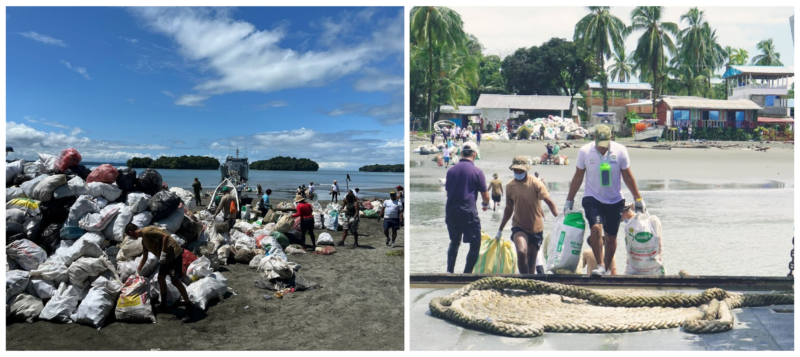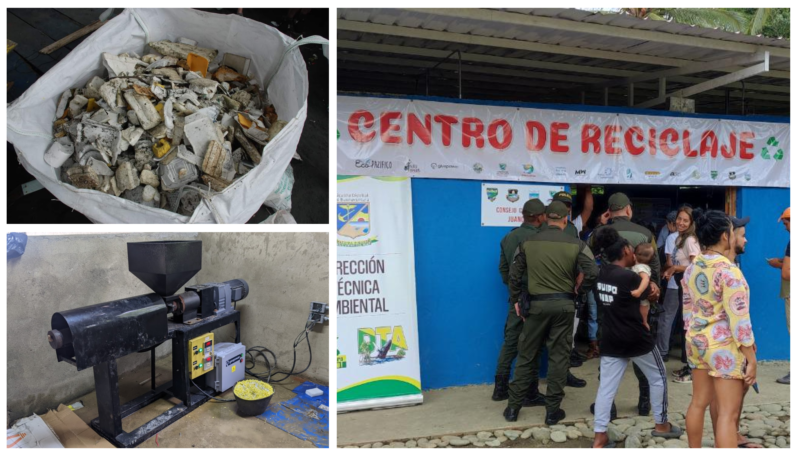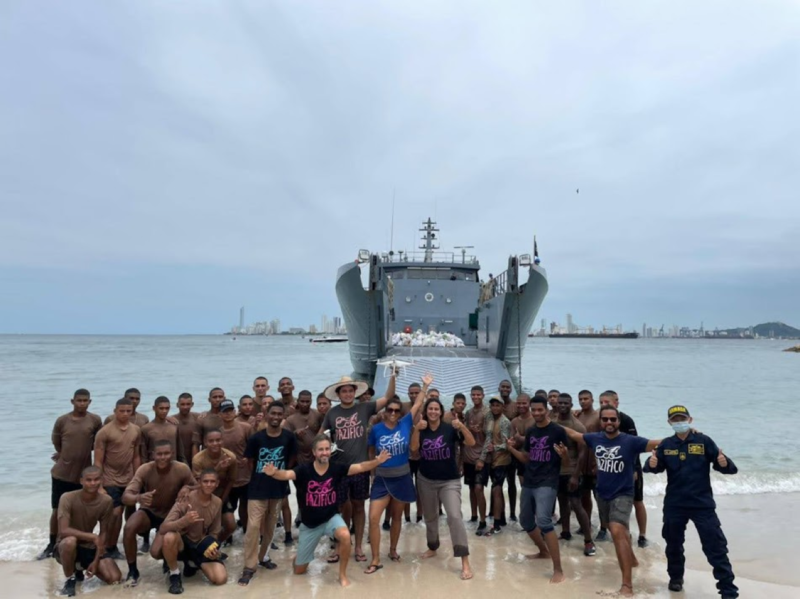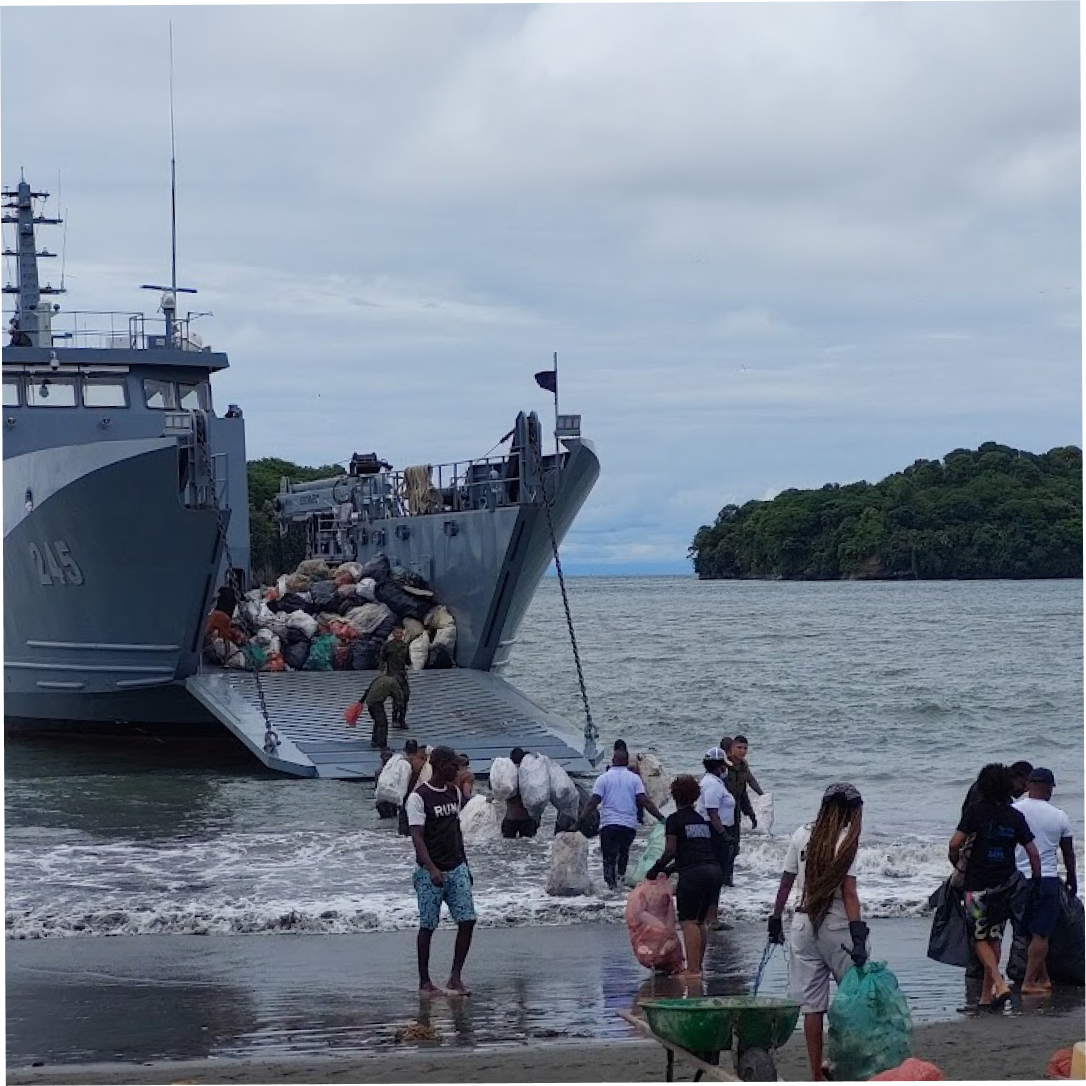Eco Pazifico is a non-profit based in Colombia. Founded by Rommy Schreiber in 2014, it focuses on cleaning coastal areas in the country and helping people in remote communities by promoting permaculture, education, and building recycling facilities.
The organization brings together interdisciplinary professionals — permaculturists, teachers, biologists, designers, sociologists, humanitarian clowns, artists, and more — all working together with a common goal: to free oceans from plastic waste and improve the lives of people.
Eco Pazifico: Cleaning the Ocean, Improving Lives
Fine Art Shippers is delighted and proud to support Eco Pazifico in its mission to clean the planet and improve lives through sustainability and art. We believe in the power of art and the true passion of environmentalists dedicated to preserving the Earth.
As a company, we do more than just handle art; we help preserve it and believe that art cannot last without a fundamental condition: a healthy and sustainable planet.
We spoke with Rommy Schreiber about the origins of Eco Pazifico, its current activities, the upcoming 10-year anniversary, and ways to support them.
Could you tell us about the origins of Eco Pazifico and the inspiration behind its creation?
Rommy Schreiber: I've always been an environmentalist, ever since my childhood. The idea to start Eco Pazifico came to me in 2014 while I was in Australia, after years of working in festival production worldwide. I had kind of an epiphany that I wanted to do something bigger for the planet. Around that time, I also began having dreams about whales.
One of the deciding factors was my visit to Juanchaco, a remote beach town on Colombia's Pacific coast. I was horrified to find this place where whales come to give birth covered in trash. Shocked by the experience, I first vowed never to return. However, I later thought I could use my network of recyclers and artists to start an art project focused on environmental education, teaching kids to create art from beach plastic.
When we arrived, we found that the community burned and buried their trash because there was no waste management system in place. So we realized we needed to establish a recycling system. That’s how we expanded from education to creating practical sustainable alternatives for the community. Eco Pazifico is based on permaculture principles, meaning we like to be efficient with our energy, time, and resources.

So your project has three parts: beach cleaning, recycling of the gathered materials, and an education program teaching children to create art with these materials? Could you tell us more about each of them?
Our environmental education program is rooted in permaculture. We teach people to understand both the Earth and themselves; it’s a holistic approach. We explain to them the dangers of plastic to animals and humans, show them how to grow trees and plants, make compost, and why eating the food they grow is better than eating package products.
We created the Beach Rangers, community members who are trained not only to collect but also to transform beach plastic waste. We’ve chosen this name to move away from the word “recyclers,” as in Colombia, it refers to people who collect various recyclable materials in cities to make a living, yet are often neglected by society. By calling them Beach Rangers, we are dignifying this important work. We provide them with cool uniforms and create a positive work environment, working constantly on empowering programs that can strengthen this environmental work. Now, even the local environmental government office has adopted the term.
Another focus of our work is Permaculture Action Weeks. These events attract volunteers from Colombia and around the world who are devoted to teaching environmental education. They share insights on global issues and discuss how to adapt alternatives based on the social dynamics and structures of each community.
During the weekends, we celebrate with a community beach clean-up, featuring music, art, humor, and healthy snacks and drinks sponsored by friends or private companies. Through our activities, we have shown the community that people from all social statuses, backgrounds, and cultures can come together in a friendly and enjoyable environment. Together, they contribute positively to the place they live in and the planet in fun and creative ways.
How often do you organize cleanups?
We conduct beach cleanups several times a year, with the Beach Rangers working from Monday to Friday for three months straight. The frequency varies, depending on our resources and the situation. For example, during the pandemic, we had to stop cleaning activities for some time. However, to keep the Pacific Coast clean, daily beach cleanups are necessary, as the tides bring in new debris every six hours.
What happens with the waste and materials you collect on the beaches?
First, I would like to mention that we don't use the word 'trash.' Instead, we came up with the term MAPARE, which stands for 'Material Para Revivir' (Material to Revive). This change helps shift the perception from waste being useless to something valuable and alive. We even created a game app where children collect colorful MAPARE in their town to create art.
Some of the materials collected by the Beach Rangers are transformed or recycled, while others are used for building eco-bricks. These are plastic bottles filled with soft plastics, which are then compacted to become sturdy building materials for homes, walls, and benches.

How do you fundraise and distribute money for various projects? How can individuals or organizations help you?
Eco Pazifico is a small organization, so we rely on sponsorships. However, these do not provide the consistent funding needed to pay the Beach Rangers for their everyday work, so we always need financial support for this.
Secondly, we have set up recycling centers and stations in remote communities. Without these, locals would simply burn and bury mixed waste on the beach, poisoning themselves and causing severe environmental damage. With sponsorships, we have installed a total of 18 recycling stations: ten on the Pacific coast, four on the Caribbean coast, and four on the Atlantic coast. A significant milestone for Eco Pazifico was a recycling center. This project, inaugurated on January 21, 2023, was built with the help of several national and international organizations and companies. Sponsors contributed in various ways: providing cement, tiles, solar panels, machinery, and more.
Thirdly, we have Permaculture Action Weeks, where we need sponsors for our environmental education programs in schools to cover expenses for teachers, materials, snacks, water, and other essentials.
Overall, Eco Pazifico is open to contributions of materials, money, time, publicity, or skills from individuals and companies. Currently, we are building a permaculture school on the Caribbean coast of Colombia, and our sponsorships are now directed towards this new project.

Eco Pazifico is celebrating its 10th anniversary this year. How are you going to celebrate this milestone?
We are planning to celebrate our 10th anniversary with the opening of the permaculture school, hopefully in July. We are collaborating with Namaste Beach Club to build it. They purchased a heavily polluted piece of land, which we've been cleaning with the help of volunteers and the Colombian Navy.
Our goal is to turn this land into a Permaculture University. Here, people from remote areas can learn vital skills like turning saltwater into freshwater, handling waste, and growing food. We understand it's unfair to ask people to take care of the environment when they don't have basic needs like water and food. By offering education and resources, we want to protect the environment and provide young people with better options than joining drug cartels or engaging in prostitution. After ten years and seeing what we have achieved, I believe this is the way to go.
Interview by Inna Logunova
Photo courtesy of Eco Pazifico
